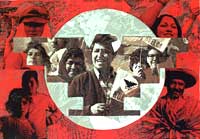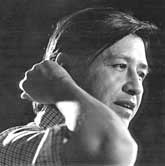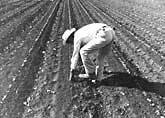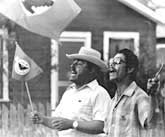 |
|
 |
 |
 Presented by |
 |
 More than two years in the making, The Fight in the Fields: Cesar Chavez and the Farmworkers' Struggle is the first film to cover the full arc of Cesar Chávez' life. More than two years in the making, The Fight in the Fields: Cesar Chavez and the Farmworkers' Struggle is the first film to cover the full arc of Cesar Chávez' life.Using archival footage, newsreel, and present-day interviews with Ethel Kennedy, former California Governor Jerry Brown, Dolores Huerta, and Chávez' brother, sister, son and daughter, among others, the documentary traces the remarkable contributions of Chávez and others involved in this epic struggle. Produced, directed, and written by Rick Tejada-Flores and Ray Telles, The Fight in the Fields is a presentation of the Independent Television Service (ITVS). The film was produced by Paradigm Productions. The two-hour documentary premiered at the 1997 Sundance Film Festival in January, aired across the nation on PBS from 1997 through 2000, and on the Sundance Channel in 2001 and 2002.
The Fight in the Fields follows the first successful organizing drive of farm workers in the United States, while recounting the many failed and dramatic attempts to unionize that led up to this victory. Among the many barriers to organizing was the Bracero Program, which flooded the fields with Mexican contract workers between World War II and the 1960s. Woven through this historical mosaic is the story of Chávez' life:
The Fight in the Fields: Cesar Chavez and the Farmworkers' Struggle is not a traditional biography. It is social history with Chávez as the central figure, and the stories of many ordinary people who were part of the movement. |
 |
Home | The Film | Chavez & UFW | Timeline | The Book | For Sale | Resources | Talkback |
||


